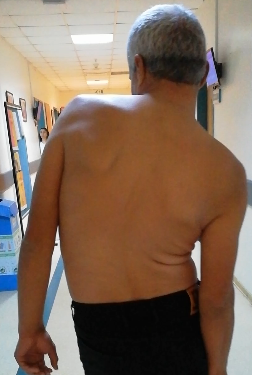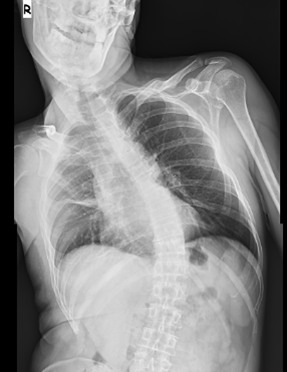Category: Drug-Induced Movement Disorders
Objective: Pisa syndrome, a movement disorder characterized by tonic, sustained lateral flexion with slight posterior rotation of the trunk, appears to be most commonly an adverse effect of antipsychotic medication.
Background: There have been two cases of amisulpride-induced acute form of Pisa syndrome in the literature.This report presents a case of refractory tardive dystonia form of Pisa syndrome during stabil low-dose amisulpride treatment.
Method: Our patient -47 year old man- had been treated with amisulpride at a stable dose of 200 mg/day for obsessive compulsive disorders for approximately the last ten years. Two years ago, he began complaining about very severe painful muscle spasms in the right side of the lomber region of the back and gradually developed lateral tonic flexion of trunk to the the right side.His brain magnetic resonance imaging blood and biochemical tests were normal. Dystonic reaction was highly suspected, amisulpride was discontinued and biperiden were prescribed, but his symptoms were gradually worsened during one year after symptoms onset. One year ago, on the last examination,he was observed walking with a tilt toward the right side (figure1). His lateral flexion of trunk aggravated during walking but alleviated by passive mobilization or supine positioning. After this evaluation, we decided to treat the muscle spasms with botulinum toxin type A.His right side of the paraspinal muscles from the level of the sixth thoracic vertebrae to the first lumbar vertebrae were injected with about total dose of 100-200UI botulinum toxin type A four times in the last year.He did not showed improvement after botulinum toxin type A treatment. We suggested the patient for treatment of globus pallidus internus deep brain stimulation.
Results: He had not predisposing risk factors except amisulpride treatment for the development of drug-induced PS. To the best our knowledge, this is the first case of chronic form of low-dose amisulpride induced-Pisa syndrome.
Conclusion: Clinicians should keep in mind the risk of chronic form Pisa Syndrome with lower doses of antipsychotics drugs during long-term treatments without another risk factors. When PS is refractory, botulinum toxin A treatment and deep brain stimulation can be suggested.
To cite this abstract in AMA style:
N. Şimşek Erdem, s. Özkaynak. Chronic form of Pisa syndrome after prolonged exposure to low-dose amisulpride treatment [abstract]. Mov Disord. 2020; 35 (suppl 1). https://www.mdsabstracts.org/abstract/chronic-form-of-pisa-syndrome-after-prolonged-exposure-to-low-dose-amisulpride-treatment/. Accessed April 20, 2025.« Back to MDS Virtual Congress 2020
MDS Abstracts - https://www.mdsabstracts.org/abstract/chronic-form-of-pisa-syndrome-after-prolonged-exposure-to-low-dose-amisulpride-treatment/


